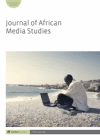
Full text loading...

This article examines the coronavirus pandemic against a burgeoning culture of post-truth in social media. The theoretical narrative reviews the social media cum post-truth epoch and identifies network fluidity of the medium, absence of gatekeepers, tempering of human thinking with machine thinking, and supremacy of alternative facts over truth as basic ingredients that oil-free reign of manipulative and propulsive forces of coronavirus’ conspiracy theories, forged news, tricky data, and disinformation. The article asserts that as the bubbles of post-truth swear up in the online media, conned objectivity and rationality are conjured to stimulate strong sentiments capable of making individuals uphold wrong beliefs about coronavirus. The study suggests the use of human actions in managing coronavirus information rather than surrendering it to machine-based computational procedures. It recommends the teaching of media literacy in African schools to moderate the consumption of information in a world suffused with infodemics.

Article metrics loading...

Full text loading...
References


Publication Date:
https://doi.org/10.1386/jams_00087_1 Published content will be available immediately after check-out or when it is released in case of a pre-order. Please make sure to be logged in to see all available purchase options.